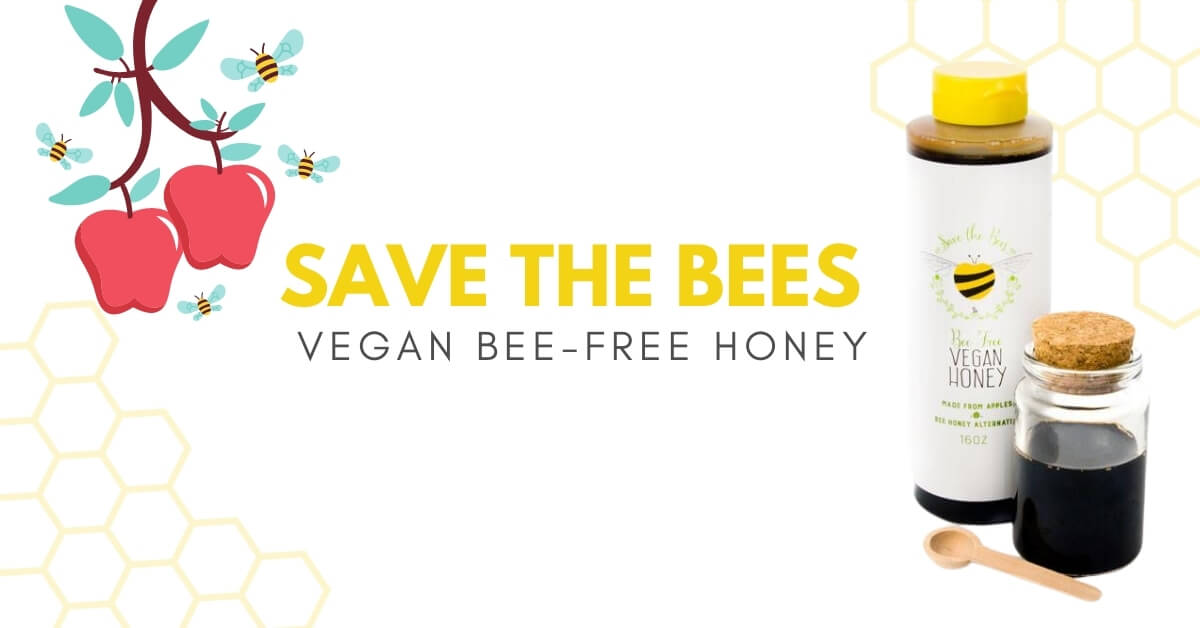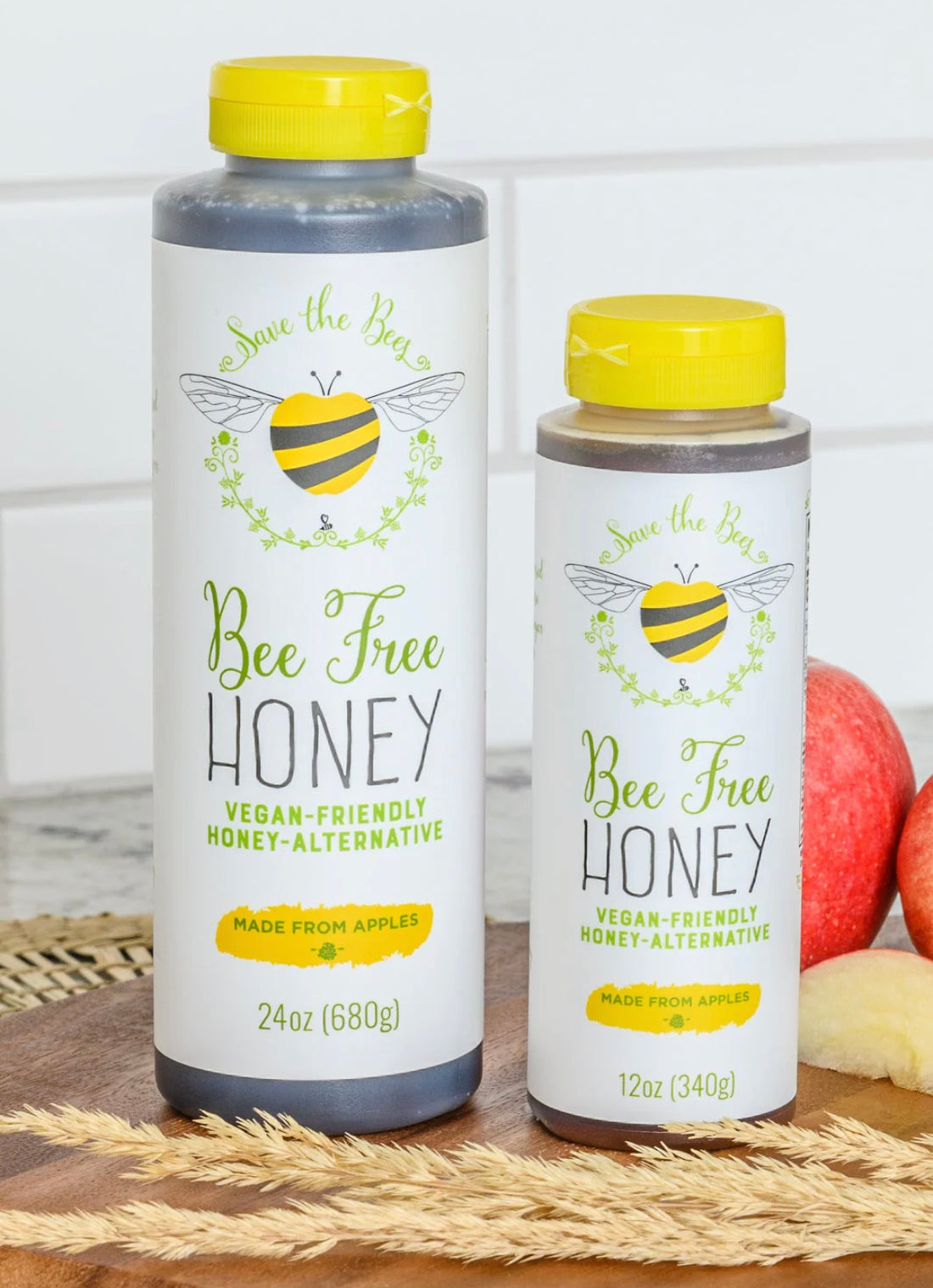Our Bees are dying at an alarming rate.
Commercial honey products, terrible farming practices, and the destruction of naturally wild ecosystems have all been leading to a massive decline in the population of bees.
It is a tragedy on a global scale and one that lies squarely at the feet of humanity.
If you are green-minded and care about the planet, then there is a very good chance that you want to save the bees. The environmental impact of their loss will be devastating for both our world and our futures.
But what can we do? How can we save the bees?
There are lots of changes that we can make, including supporting the vegan honey industry and making changes to our agricultural practices.
Read on to find out what is happening to the bees in our world, how to help save the bees, and why changing our diet to vegan options could be the answer to our future survival.
Why Are The Bees Important?

Greenpeace estimates that you should thank the bees with every third bite of food you eat as it was likely produced thanks to them.
Bees are pollinators, so they spend their time moving pollen from one plant species to another, and this allows the plants to breed and produce more plants.
If we lose the bees, the planet loses its ability to keep plants pollinated, and the impact on agricultural ecosystems will be devastating. Over 90% of wild plants need animal pollinators to continue their lifecycle. Without bees, this cycle is broken and irreparable, and all of these plants will die off.
The threat to our way of life and even our continued existence on this planet is severe and closely linked to the survival of the bee population.
What Is Happening To Bee Populations?
Beekeepers are reporting between 29% and 40% of their bee colonies are dying off each year. The average falls around 30%, which is an unprecedented increase in natural levels of die-off since 2004.
Bees will naturally die in the winter, and this is part of the hive lifecycle. However, this die-off is usually at a level of 10% of the colony. The hive will replace these bees in the spring if the hive is healthy and able to reproduce.
With the unnatural die-off rate added to the natural decline of the bee colony, hives are unable to recover the workers they need to remain active. The hive colony falls into collapse, and often all the bees are lost.
Populations of wild bees are also in decline, and both are beyond a limit that is sustainable for the future. We need to act now if we want to help save the honey bees for our children's futures.
What Is Killing The Bees?
There are three leading causes: agrochemicals, loss of habits, and unethical beekeeping.
Monocropping is where large swathes of land are cultivated to plant and produce just one kind of crop. Wild meadowland, the native habitat of many wild bees, has been destroyed to allow for monocropping cultivation.
This continued destruction of wild bee habitats is a significant contributor to the continued decline of the bee population. One wild bee, the rusty patched bumblebee, has lost over 80% of its natural habitat and is now endangered.
Another finger of blame is firmly pointed at the chemical industry and the production of pesticides. These companies have pumped millions of dollars into PR campaigns to push the responsibility away from themselves and muddle the truth about what is happening. However, the science is abundantly clear.
Pesticides are used in agriculture and even in our own backyards. While they help keep plants bug-free, they also cripple and kill the local honey bee population. Scientists have shown that hives can contain a chemical cocktail of pesticides that bees have brought back home with their pollen.
Reducing the most dangerous pesticides from our farming production and gardening industries would undoubtedly be a significant step towards helping the honey bees. However, pesticides alone are not to blame for the decline, and we also need to consider the honey industry.

The Unethical Honey Industry
There can often be some debate in the vegan community about whether beekeeping and eating honey is an ethical and vegan practice. The general consensus when you look at the evidence is that it is not. There is a lot of unethical beekeeping that exploits honey bees and contributes to their declining populations.
Many people mistakenly believe that honey bees make their honey for our consumption, which is a wholly false belief. The honey that they create is a fuel source for the hive, and it is essential for their existence.
Honey is, in fact, one of the primary energy sources that the bees need to survive through harsh winters. So, by removing this from their hives, we are directly contributing to their annual die-off by starving the bees when they most need it.
We can change this by moving to vegan honey that can replace the products produced by commercial beekeepers.
How Is Honey Made?
Forager bees gather pollen from flowers and turn it into nectar within the hive. When they visit a flower, they store the pollen in one of their two stomachs: one for pollen storage and one for eating. They can also keep additional pollen on their fur.
When a bee is full, the amount of pollen it carries can weigh almost as much as the bee does! Imagine flying a considerable distance while carrying your own body weight in pollen. It is an incredible feat.
This is why bees need to eat when they are out gathering pollen and why they are killed by the pesticides when they are visiting different flowers.
Once back at the hive, the forager bees regurgitate the pollen from their stomachs directly into the house bees' mouths. This process is a little gross sounding for us but natural for the bees. The house bees then break down the nectar's sugars and store them in the beeswax.
They then cool the substance by fanning it with their wings until it is transformed into what we know as honey. It can then be used as a food source for the bees in the colony. However, at this point, we harvest it and take it as our own.

How Commercial Honey Farming Impacts the Bees
We take the honey the bees have made from their hive and use it in our own foods, cosmetics, and health supplements. Commercial beekeepers want to harvest high yields of honey for their own financial benefits. So the more the bees can produce, the better the hive is rated.
Commercial beekeepers do not take all of the honey. They do leave some for the bees to use; however, it is often nowhere near enough. Additionally, to replace the honey that they take, they substitute it with a sugar solution to feed the bees.
However, this sugar solution is far from sufficient for maintaining the bees' well-being. It doesn't contain most of the micro-nutrients that the bees require that are found in honey. As such, the bees become malnourished, and some eventually die of starvation.
Without the proper nutrients, bees often become ill or infected with parasites. The continual gassing of the hive to make them sleepy enough for the beekeeper to remove the honey also has negative impacts on their health.
As a hive's health declines, so does its value, and often commercial hives are simply incinerated rather than maintained once their value dips below a certain value or to prevent diseases from spreading.
How Can I Help Save The Bees?
We need to take action now if we are going to save our bee populations and save wild agriculture. There are lots of things you can do to help save the honey bee. The main thing you can do is get involved.
Check out your local or national save the bees foundations and make contact with them for further steps. In the meantime, follow our advice and learn how we can save the bees together.
-
Stop Buying Commercial Bee Honey Products
- Commercial honey production needs to come to an end. The best way you can help with this is to stop purchasing bee-made honey products. There are alternatives that you can consider instead, and your refusal to contribute to the industry will help force it into decline.
-
Eat Vegan Honey
- Vegan Honey Vegan honey is a delicious alternative to eating honey made by bees. It is made from 100% organic ingredients and will allow you to still enjoy your favorite sweet treats without any of the guilt that goes with them.
-
Plant WildFlowers
- One way you can learn how to help save the bees is to look into planting a natural habitat for them. If you have a backyard or allotment, you can plant flowers that attract wild bees naturally. Encourage your local community to grow wildflower spaces and meadows and to let their gardens have a more natural look in places. Give the wild bees somewhere that they can call home again.
-
Stop Using Pesticides
- If you garden at home or grow vegetables locally, you need to stop using pesticides that are harmful to bees. Contact save the bee organizations to find out which pesticides are safe to use to keep your garden in a natural state and safe for bees.
-
Lobby Your Government
- Speak to your local government representative and get them to lobby for changes to agricultural processes and better pesticide controls. Only by making changes at the highest level can we hope to save the bees through governmental restrictions.
-
Join A Bee Support Organization
- Find a save the bees organization and offer your time, money, or support in any way that you can. You can help raise money, spread awareness about the cause and help develop areas to become more bee-friendly environments.
-
Keep Bees
- If you have the resources, then you can start a hive of your own, not to exploit bees for the honey but simply to let them live in safety and comfort. There are lots of resources online, including The Bee Conservancy that teach you how to start your own hive and become an ethical beekeeper. The Bee Conservancy is an especially good resource.
-
Spread The Word
- Tell everyone what you know about the decline of bee populations and the effects of commercial honey production. Go onto social media and let people know what they can also do to help save the planet. Promote bee-free products and encourage others to make the swap to vegan for a better bee-friendly world.

How Vegan Honey Can Help Save The Bees
All the evidence above shows us that our current trajectory is unsustainable. If we continue commercially farming bees to the extent that we have been for decades, we will see their extinction in the very near future. The impact that will have on the looming environmental crisis is a very frightening prospect.
But changing our commercial honey-making practices does not need to be hard at all. There are many ways we can reproduce the sweet taste and experiences of honey without exploiting the bees.
We have a range of incredibly delicious and nutritious shakes and blends that can include vegan honey and have zero impact on the bee population.
Here’s Everything You Need to Know About Saving the Bees
Save The Bees With Our Vegan Honey Products
We produce entirely organic bee-free honey that has all of the sweetness of bee-made honey, but without any of the guilt. It is made from apples, grown organically and ethically. You can use it as a smoothie base or simply as a sweetener as you would with bee-made honey.
Check out our products page and see if anything takes your fancy.
Go green, save the bees, and feel great about helping the environment.






